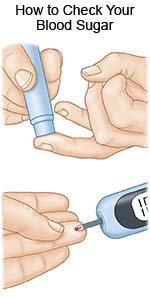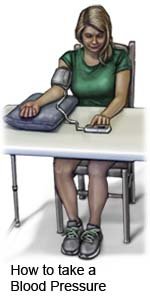Intracerebral Hemorrhage
Medically reviewed by Drugs.com. Last updated on Apr 2, 2024.
What is an intracerebral hemorrhage (ICH)?
An ICH, or hemorrhagic stroke, is bleeding in the brain. An ICH happens when a blood vessel tears or bursts. Blood then leaks out of the vessel and slows or stops blood flow to the brain. The leaked blood may also collect in one area. This is called a hematoma. A hematoma can create pressure that keeps oxygen from flowing to the brain. Brain damage may happen within a few minutes if the brain cannot get enough oxygen. An ICH is a medical emergency that needs immediate care.
 |
What are the warning signs of a stroke?
The words BE FAST can help you remember and recognize warning signs of a stroke:
- B = Balance: Sudden loss of balance
- E = Eyes: Loss of vision in one or both eyes
- F = Face: Face droops on one side
- A = Arms: Arm drops when both arms are raised
- S = Speech: Speech is slurred or sounds different
- T = Time: Time to get help immediately
 |
What are the signs and symptoms of an ICH?
Signs and symptoms depend on which part of your brain is injured. One or more of the following may appear within minutes or hours, and worsen quickly:
- Severe headache, neck pain, or a stiff neck
- Nausea and vomiting, or trouble swallowing
- Blurred or double vision, or vision loss
- Trouble waking up, or being less awake than usual
- Numbness, tingling, weakness, or paralysis on one side of your body
- Trouble walking, or balance or coordination problems
- Trouble speaking, or not understanding spoken or written words
- Seizures, or unusual behavior
What increases my risk for an ICH?
- High blood pressure, high cholesterol, or diabetes
- A head injury
- Damage to a blood vessel from an arteriovenous malformation (AVM) or blood clot in the blood vessel
- Blood thinning medicine or a blood clotting disorder
- Use of cigarettes, large amounts of alcohol, or drugs that increase blood pressure, such as cocaine
- A family history of stroke
- In women, blood pressure conditions that develop during pregnancy, such as eclampsia
How is an ICH diagnosed?
- CT or MRI pictures are used to find the bleeding and check for damage to your brain. Do not enter the MRI room with anything metal. Metal can cause serious injury. Tell the healthcare provider if you have any metal in or on your body.
- Blood tests may be used to check your overall health. The tests may include a check for diabetes or clotting disorders. Diabetes or a clotting disorder can increase your risk for an ICH.
How is an ICH treated?
- Medicines may be given to help stop the bleeding or lower your blood pressure. You may also need medicine to decrease pain, reduce brain pressure, or prevent seizures.
- Surgery may be needed to stop the bleeding or remove blood that has leaked out of the blood vessels. A tube may be placed in your skull to drain fluid. This will help decrease pressure in your brain and prevent more damage. The tube may also monitor pressure in your brain.
What can I do to manage or prevent an ICH?
Healthcare providers will help you create goals for your recovery. The following lifestyle changes can help you reach your goals and lower your risk for another ICH:
- Manage health conditions. A condition such as diabetes can increase your risk for a stroke. Control your blood sugar level if you have hyperglycemia or diabetes. Take your prescribed medicines and check your blood sugar level as directed.

- Check your blood pressure as directed. High blood pressure can increase your risk for a stroke. Follow your healthcare provider's directions for controlling your blood pressure.

- Do not use nicotine products or illegal drugs. Nicotine and other chemicals in cigarettes and cigars can cause blood vessel damage. Nicotine and illegal drugs both increase your risk for a stroke. Ask your healthcare provider for information if you currently smoke or use drugs and need help to quit. E- cigarettes or smokeless tobacco still contain nicotine. Talk to your healthcare provider before you use these products.
- Do not drink alcohol. Alcohol increases your risk for a stroke. Alcohol may also raise your blood pressure or thin your blood. Blood thinning can cause an ICH.
- Eat a variety of healthy foods. Healthy foods include whole-grain breads, low-fat dairy products, beans, lean meats, and fish. Eat at least 5 servings of fruits and vegetables each day. Choose foods that are low in fat, cholesterol, salt, and sugar. Eat foods that are high in potassium, such as potatoes and bananas. A nutritionist can help you create healthy meal plans.

- Maintain a healthy weight. Ask your healthcare provider what a healthy weight is for you. Ask him or her to help you create a weight loss plan, if needed. He or she can help you create small goals if you have a lot of weight to lose.
- Exercise as directed. Exercise can lower your blood pressure, cholesterol, weight, and blood sugar levels. Healthcare providers will help you create exercise goals. They can also help you make a plan to reach your goals. For example, you can break exercise into 10 minute periods, 3 times in a day. Find an exercise that you enjoy. This will make it easier for you to reach your exercise goals.

- Manage stress. Stress can raise your blood pressure. Find new ways to relax, such as deep breathing or listening to music.
Where can I find support and more information?
- American Stroke Association
Phone: 1- 888 - 478-7653
Web Address: http://www.stroke.org
Have someone call your local emergency number (911 in the US) if:
- You have any of the following signs of a stroke:
- Numbness or drooping on one side of your face
- Weakness in an arm or leg
- Confusion or difficulty speaking
- Dizziness, a severe headache, or vision loss

- You have a seizure.
- You have chest pain or shortness of breath.
- You cough up blood.
When should I seek immediate care?
- Your arm or leg feels warm, tender, and painful. It may look swollen and red.
- You have unusual or heavy bleeding.
When should I call my doctor?
- You have trouble swallowing.
- Your blood pressure or blood sugar level is higher or lower than you were told it should be.
- You have questions or concerns about your condition or care.
Care Agreement
You have the right to help plan your care. Learn about your health condition and how it may be treated. Discuss treatment options with your healthcare providers to decide what care you want to receive. You always have the right to refuse treatment. The above information is an educational aid only. It is not intended as medical advice for individual conditions or treatments. Talk to your doctor, nurse or pharmacist before following any medical regimen to see if it is safe and effective for you.© Copyright Merative 2024 Information is for End User's use only and may not be sold, redistributed or otherwise used for commercial purposes.
Learn more about Intracerebral Hemorrhage
Treatment options
- Medications for Central Nervous System Disorders
- Medications for Head Injury w/ Intracranial Hemorrhage and Loss of Consciousness
- Medications for Hemorrhagic Stroke
- Medications for Syphilitic Ruptured Cerebral Aneurysm
Care guides
Symptoms and treatments
Further information
Always consult your healthcare provider to ensure the information displayed on this page applies to your personal circumstances.
